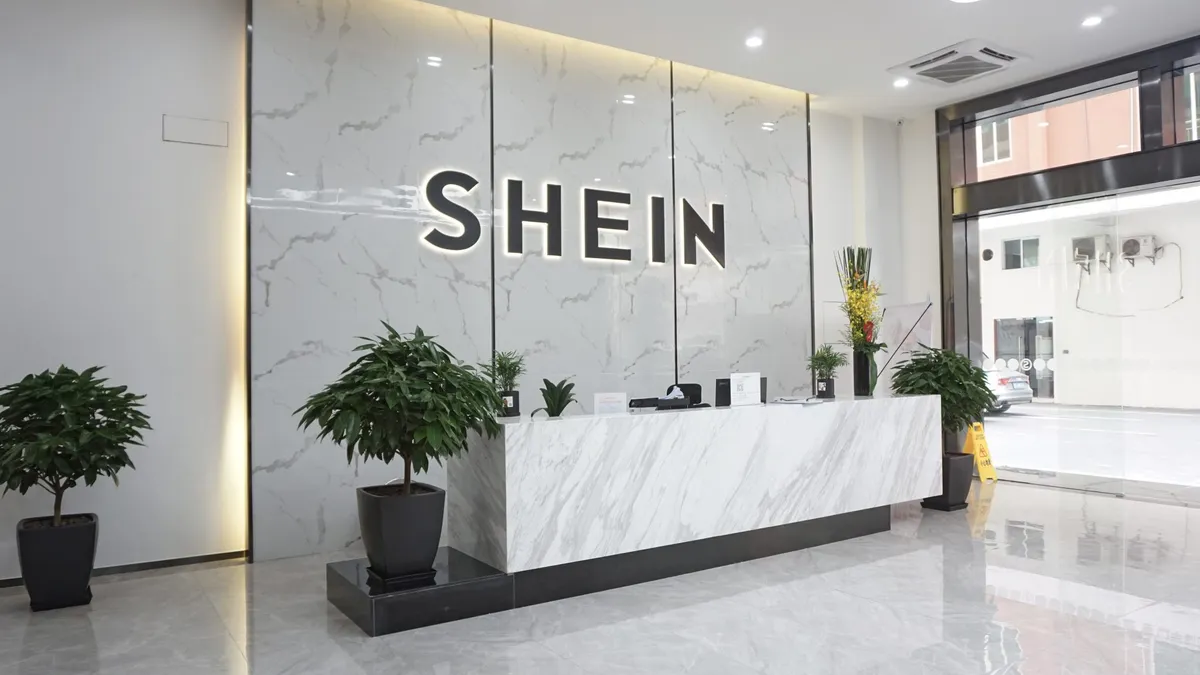Dive Brief:
- Workers in Shein factories on average earn between 6,000 and 10,000 Chinese yuan per month, or about $831 to $1,385, according to a report human rights and environmental advocacy organization Public Eye released last week.
- The May 14 report, which was compiled using data from interviews with 13 Shein factory workers, found that employees worked 12-hour shifts, six or seven days per week.
- In its public statement, Shein said the report didn’t convey the “reality of SHEIN as an organization,” and further said it was committed to being a responsible company and working “with governments and authorities around the world to ensure we comply with the laws and regulations in the markets we operate in.”
Dive Insight:
Shein said it was investing “tens of millions of dollars” into strengthening compliance across its supply chain and released an overview of its approach to supply chain governance.
Public Eye’s latest report was a follow up to its previous investigation, “Toiling away for Shein,” which was published in 2021 and examined working conditions in a Shein factory.
The 2021 report found that Shein factory employees worked 75 hours a week, and the wages reported last week were also similar.
A living wage in China is about 6,512 yuan, per the Asia Floor Wage Alliance. Public Eye said that because employees work more than 75 hours per week instead of 40 hours, without overtime pay, their average salary is about 2,400 yuan per month.
“While we do not recognize many of the allegations in this report, the discussion on working hours and wages raised by Public Eye is important to us, and we have made significant progress on enhancing conditions across our ecosystem,” a Shein spokesperson said in an email to Fashion Dive.
The report says that Shein also implements “rigid quality controls” among needleworkers.
“If the quality is not up to the company’s expectations, it can be costly,” the report stated. “A quality check supervisor stated that his company would be ‘punished’ by having an order cancelled for every defective batch. And any stitcher whose work is not up to scratch (and who can be easily identified from their small orders) has to perform alterations unpaid, according to the interviewees.”
Report authors stated that they saw toddlers and young people in the workshops. Authors said teenagers “performed simple tasks, such as packaging, or sat at the sewing machines themselves, instructed by their parents, presumably to learn their trade,” although Shein has a strict zero tolerance policy for child labor, per the report. Interviewees noticed an increase in the number of surveillance cameras in and around suppliers, the report stated.
Authors also highlighted fire risks in the factories because smoking bans weren’t enforced.
Public Eye’s report collected interviews from employees across six factories in the Guangdong Province of China in summer 2023. The Shein spokesperson said that “though all voices in our supply chain are important, this small sample size should be seen in the context of our comprehensive ongoing process to continually improve our supply chain, which involves engaging with thousands of suppliers and workers within the supply chain.”
Shein has faced pressure from U.S. lawmakers over its supply chain. Last year, congresspeople asked Shein to detail its compliance with the Uyghur Forced Labor Prevention Act, which bans products from Xinjiang region in China, among other requests.
Shein has continually spent money on U.S. lobbying efforts, which could indicate that the company is looking to clean up its image amid rumors of a potential U.S. IPO. In the first quarter of this year, the company spent $970,000 on lobbying, significantly more than the $610,000 and $680,000 it spent in the two previous quarters, according to federal filings.
Beyond regulatory and government pressure, the company has also faced legal challenges from individuals and competitors over copyright infringement.
A group of independent artists sued the fast fashion giant under federal racketeering laws last year, and the company is additionally facing a class action lawsuit from other artists that claims Shein has copyright infringement “baked into” its business model.
Both Uniqlo and H&M have sued Shein in international courts for similar claims. Meanwhile, Temu, perhaps Shein’s largest competitor, is suing Shein for infringing on its intellectual property rights as well as trying to “illegally interfere with Temu’s business.”













